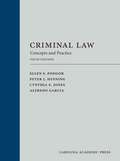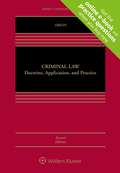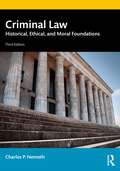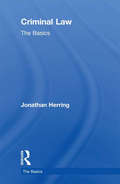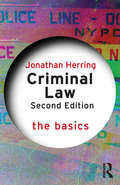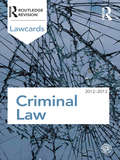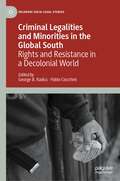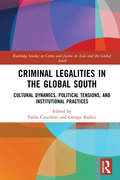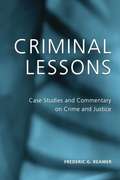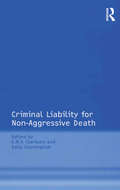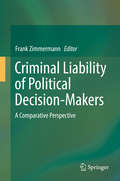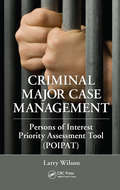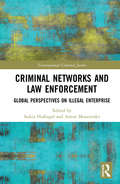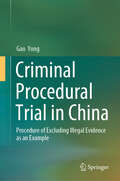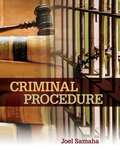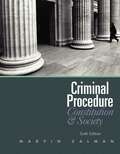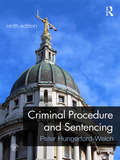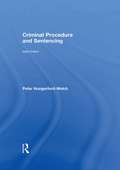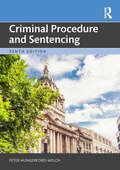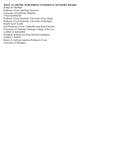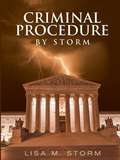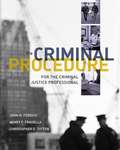- Table View
- List View
Criminal Law: Cases, Materials, and Lawyering Strategies
by John T. Parry David Crump Neil P. Cohen Penelope PetherThis casebook contains all of the subjects that ought to be covered in a first course in Criminal Law. The elements of crimes, actus reus and mens rea receive thorough coverage. The basic crimes, including homicide, sexual assault (or rape), theft, and related offenses, are there. The book covers multiple party crimes and preparatory offenses. Sentencing receives a major chapter. And the justification and legality of the criminal law, including constitutional limits on crime definition and the relationship between crimes, harm, and morals, are all covered.
Criminal Law: Concepts and Practice
by Ellen Podgor Cynthia Jones Alfredo Garcia Peter HenningCriminal Law: Concepts and Practice is a leader in providing materials that match the skills and values emphasized for developing practicing lawyers. Now incorporating color, the fifth edition incorporates over fifty problems that allow professors to explore the practical impact of the theoretical concepts underlying criminal law. The book challenges students to consider issues of race in the criminal justice system. It retains its international and comparative notes and now includes several new cases and charts to assist students in better understanding the material. The authors support a website, criminallawbook.com, that offers podcasts, syllabi, PowerPoints, and other teaching materials that complement the book. In short, the text combines theory and practice and is compact, student friendly, flexible, and high tech.
Criminal Law: Doctrine, Application, and Practice (Aspen Casebook)
by Jens David OhlinThis book is designed to respond to the changing nature of law teaching by offering a shorter, flexible, and more doctrinal approach, with an emphasis on application. Materials are presented, in a visually lively style, via a consistently structured pedagogy within each chapter: Doctrine (treatise-like explanation), Application (cases), and Practice/Policy (questions providing an opportunity for normative critique of the law and exploration of practical and strategic challenges facing criminal lawyers). Theory is integrated into the doctrine section rather than conveyed through law review excerpts, so as to help students make the necessary connections to doctrinal issues. <P><P> Aggressively-edited cases help keep the length to a minimum, and modern cases will engage younger students and professors. Key Features: New chapter titled “Other Offenses Against the Person,” which includes coverage of physical battery, assault, and kidnapping (Chapter 15). Integrated notes throughout the casebook directing students to view a series of 20 short video clips that bring the doctrinal controversies to life in a fictional courtroom. More cases added to represent the plurality of approaches in different jurisdictions. The addition of several “classic” criminal law cases familiar to law school professors. More examples in the “Doctrine” section of each chapter. “Practice and Policy” section in each chapter urges students to consider how the various actors in the process (prosecutors, defense counsel, judges and juries) make particular decisions and the strategic calculations that informed them, and make this casebook more practice-ready than others. Innovative pedagogy emphasizes application of law to facts (while still retaining enough flexibility so as to be useful for a variety of professors with different teaching styles)
Criminal Law: Historical, Ethical, and Moral Foundations
by Charles P. NemethCriminal Law: Historical, Ethical, and Moral Foundations, 3rd edition, blends legal and moral reasoning in the examination of crimes and explores the history relating to jurisprudence and roots of criminal law. In order to fully grasp criminal law concepts, students must go beyond mere rote memorization of the penal code and endeavor to understand where the laws originate from and how they have developed. This book fosters discussions of controversial issues and delivers abridged case law decisions that target the essence of appellate rulings. Grounded in the Model Penal Code, making the text national in scope, this volume examines: Why the criminal codes originated, and the moral, religious, spiritual, and human influences that led to our present system How crimes are described in the modern criminal justice model The two essential elements necessary for criminal culpability: actus reus (the act committed or omitted) and mens rea (the mind and intent of the actor) Offenses against the body resulting in death, including murder, manslaughter, felony murder, and negligent homicide Non-terminal criminal conduct against the body, including robbery, kidnapping, false imprisonment, assault, and hate crimes Sexual assault, rape, necrophilia, incest, and child molestation Property offenses, such as larceny/theft, bribery, forgery, and embezzlement Crimes against the home, including burglary, trespassing, arson, and vandalism The book also examines controversial public morality issues such as prostitution, drug legalization, obscenity, and pornography. The final two chapters discuss inchoate offenses, where the criminal act has not been completed, and various criminal defenses, such as legal insanity, entrapment, coercion, self-defense, and mistake of fact or law. Important keywords introduce each chapter, and discussion questions and suggested readings appear at the end of each chapter, prompting lively debate and further inquiry into a fascinating subject area that continues to evolve. Updated to include the latest developments in the law, this book is appropriate for undergraduate students in criminal law and related courses.
Criminal Law: The Basics (The Basics)
by Jonathan HerringCriminal Law: The Basics is an insightful introduction to the legal aspects of criminal acts, ranging from battery to burglary and harassment to homicide. Starting with an in-depth exploration of the very concept of crime, this book considers such questions as: how should we decide what is criminal and what isn’t? what is the difference between murder and manslaughter? could you ever be guilty of stealing your own property? what defences are available to those accused of crime? The book features numerous case studies from the infamous to the bizarre and key questions for consideration throughout. Each chapter ends with lists of relevant cases, statutes and suggestions for further reading, making this an ideal starting point for anyone interested in criminal law.
Criminal Law: The Basics (The Basics)
by Jonathan HerringCriminal Law: The Basics is an insightful introduction to the legal aspects of criminal acts, ranging from battery to burglary and harassment to homicide. Starting with an in-depth exploration of the very concept of crime, the book considers key questions such as: • How should we decide what is criminal and what isn’t? • What is the difference between murder and manslaughter? • Could you ever be guilty of stealing your own property? • What defences are available to those accused of crime? Featuring a range of case studies, from the infamous to the bizarre, the new edition has been thoroughly updated to include new material on loss of control, accessorial liability, dishonesty, causation, liability, manslaughter and sexual offences. Relevant cases, statutes and suggestions for further reading are included throughout, making Criminal Law: The Basics the ideal starting point for anyone studying this area for the first time.
Criminal Lawcards 2012-2013 (Lawcards)
by RoutledgeRoutledge Lawcards are your complete, pocket-sized guides to key examinable areas of the undergraduate law curriculum and the CPE/GDL. Their concise text, user-friendly layout and compact format make them an ideal revision aid. Helping you to identify, understand and commit to memory the salient points of each area of the law, shouldn’t you make Routledge Lawcards your essential revision companions? Fully updated and revised with all the most important recent legal developments, Routledge Lawcards are packed with features: Revision checklists help you to consolidate the key issues within each topic Colour coded highlighting really makes cases and legislation stand out Full tables of cases and legislation make for easy reference Boxed case notes pick out the cases that are most likely to come up in exams Diagrams and flowcharts clarify and condense complex and important topics '...an excellent starting point for any enthusiastic reviser. The books are concise and get right down to the nitty-gritty of each topic.' - Lex Magazine Routledge Lawcards are supported by a Companion Website offering: Flashcard glossaries allowing you to test your understanding of key terms and definitions Multiple Choice Questions to test and consolidate your revision of each chapter Advice and tips to help you better plan your revision and prepare for your exams Titles in the Series: Commercial Law; Company Law; Constitutional Law; Contract Law; Criminal Law; Employment Law; English Legal System; European Union Law; Evidence; Equity and Trusts; Family Law; Human Rights; Intellectual Property Law; Jurisprudence; Land Law; Tort Law
Criminal Legalities and Minorities in the Global South: Rights and Resistance in a Decolonial World (Palgrave Socio-Legal Studies)
by Pablo Ciocchini George B. RadicsThis book explores how the law and the institutions of the criminal justice system expose minorities to different types of violence, either directly, through discrimination and harassment, or indirectly, by creating the conditions that make them vulnerable to violence from other groups of society. It draws on empirical insights across a broad array of communities and locales including Afghanistan, Colombia, Pakistan, India, Malawi, Turkey, Brazil, Singapore, Puerto Rico, and the Philippines. It examines the challenges of protecting those at the margins of power, especially those whom the law is often used to oppress. The chapters explore intersecting, marginal identities influenced by four factors: rebuilding after violent regimes, economic interest behind the violence, entrenched cultural biases, and criminalisation of diversity. It provides scholars from the Global North with important lessons when attempting to impose their own solutions onto nations with a different history and context, or when applying their own laws to migrants from the Global South nations explored in this book. It speaks to legal and social science scholars in the fields of law, sociology, criminology, and social work.
Criminal Legalities in the Global South: Cultural Dynamics, Political Tensions, and Institutional Practices (Routledge Studies in Crime and Justice in Asia and the Global South)
by Pablo Ciocchini George RadicsThis edited volume presents the work of academics from the Global South and explores, from local and regional settings, how the legal order and people’s perceptions of it translates into an understanding of what constitutes "criminal" behaviors or activities. This book aims to address the gap between criminal law in theory and practice in the Global South by assembling 11 chapters from established and emerging scholars from various underrepresented regions of the world. Drawing on research from Singapore, the Philippines, Peru, Indonesia, India, the Dominican Republic, Burma, Brazil, Bangladesh, and Argentina, this book explores a range of issues that straddle the line between social deviance and legal crimes in such societies, including extramarital affairs, gender-based violence, gambling, LGBT issues, and corruption. Issues of inclusivity versus exclusivity, modernity versus tradition, globalization of capital versus cultural revivalism are explored. The contributions critically analyze the role politics and institutions play in shaping these issues. There is an urgent need for empirical studies and new theoretical approaches that can capture the complexity of crime phenomena that occur in the Global South. This book will provide essential material to facilitate the development of new approaches more suitable to understanding the social phenomena related to crime in these societies. This book will make an important contribution in the development of Southern criminology. It will be of interest to students and researchers of criminology and sociology engaged in studies of sentencing and punishment, theories of crime, law and practice, and postcolonialism.
Criminal Lessons: Case Studies and Commentary on Crime and Justice
by Reamer Frederic G.One of social work's most distinguished theoreticians speculates about the factors that leads to crime and considers what we can do to prevent and respond to it meaningfully. The book is based on more than thirteen thousand cases in which Frederic G. Reamer has been involved as a parole board member. Reamer uses actual case studies to illustrate these patterns of "criminal circumstances."
Criminal Lessons: Case Studies and Commentary on Crime and Justice
by Frederic G. ReamerWhy do people commit crimes? How can crime be prevented? And what can society and criminal justice professionals do to implement constructive responses to criminal behavior? Summarizing what he has learned about crime and criminals during his long career, one of social work's most distinguished theoreticians speculates about the factors that lead to crime and considers what we can do to prevent and respond to it meaningfully. Criminal Lessons is based on more than thirteen thousand cases in which Frederic G. Reamer has been involved as a parole board member, a role that was supplemented by his earlier experiences working in a federal correctional facility, a state penitentiary, and a forensic unit in a state psychiatric hospital. Reamer presents an original and compelling typology of crime that classifies offenders on the basis of the circumstances that led to their offenses. He isolates seven categories, tracing crime to desperation, greed, rage, revenge, frolic, addiction, or mental illness. Using actual case studies to illustrate these patterns of 'criminal circumstances,' Reamer presents a model for the prevention of, and response to, crime and throughout the book offers recommendations related to social services, criminal justice, and public policy.
Criminal Liability for Non-Aggressive Death
by Sally CunninghamThe crime of manslaughter exists as a 'catch-all offence' to punish those who are blameworthy in causing the death of another but whose culpability falls short of that required for murder. Manslaughter is an extremely broad offence and it has a difficult task in ensuring that all those who warrant punishment for 'non-aggressive' deaths are convicted. Simultaneously, it should not be too broad in covering those who do not warrant punishment for such deaths. There is little consistency in whether a particular dangerous activity leads to liability for a specific offence or for the generic offence of manslaughter when death is caused. This book examines the current law and includes a variety of perspectives on the subject with chapters on specific modes of killing as well as issues that permeate all areas. The first half of the book deals with issues such as how any special offences for non-aggressive death should relate to a hierarchy of homicide offences. The second half deals with issues specific to different activities, which may or may not justify the creation of specific homicide offences. The book includes a comparative chapter on Australian law.
Criminal Liability of Political Decision-Makers: A Comparative Perspective
by Frank ZimmermannThis book is dedicated to a fundamental conflict in modern states: those persons holding public office are no more than ordinary citizens. Therefore, their activities must - as a matter of principle - be subject to full judicial control. But at the same time, democratically legitimated politicians need some discretion in their decision-making. Allegations of politicians committing criminal offences in office quickly attract a great deal of media attention. Even politicians themselves frequently use such allegations to discredit their political opponents. However, to date this topic has not been fully addressed on an academic level. This book is a first step in this direction. The individual contributions cover topics such as: "bad" political decisions that result in a waste of taxpayers' money corruption and conflicts of interest in political decision-making immunities and procedural obstacles to the effective prosecution of politicians abuse of criminal law and criminal proceedings in the political arena criminal liability for decisions taken in situations of state emergency the role of criminal law in public opinion. Leading experts examine these and other issues from a comparative perspective.
Criminal Major Case Management: Persons of Interest Priority Assessment Tool (POIPAT)
by Larry WilsonIn high-profile investigations, when the suspect pool is very large, resources are unduly strained unless the pool can be narrowed down to the most likely offenders. The Persons of Interest Priority Assessment Tool (POIPAT) provides an objective and consistent means of establishing a priority ranking of suspects or persons of interest in any invest
Criminal Networks and Law Enforcement: Global Perspectives On Illegal Enterprise (Transnational Criminal Justice)
by Saskia Hufnagel Anton MoiseienkoThis collection presents an analysis of illicit networks and discusses implications for law enforcement and crime prevention. The contributors draw on a range of methodologies and apply them to diverse international criminological settings, from illegal fishing in the Indo-Pacific to ‘money mule’ networks in the Netherlands. Using a variety of examples, the book elucidates how and why criminals form networks of cooperation and how they can be disrupted. It is expected to be of interest to those who study criminology or criminal law, as well as law enforcement practitioners.
Criminal Procedural Trial in China: Procedure of Excluding Illegal Evidence as an Example
by Gao YongThis book examines procedural trials using the procedure of excluding illegal evidence as an example. Criminal trials include both substantive and procedural trials. The former focuses on the criminal responsibility of the defendant, while the latter aims to resolve procedural disputes between the prosecution and the defense. The illegal evidence exclusion process is a typical procedural trial that examines the lawfulness of evidence taking and excludes illegally obtained evidence.The object of the study is the procedural rules of excluding illegal evidence in China. This book is innovative in that it examines the nature, function, subject matter, and litigation structure of procedural trials, and the relationship between procedural and substantive procedures. Moreover, the book compares various countries' procedure of excluding illegal evidence and examines the initiation, trial, rules of evidence, and appeals of the procedure of excluding illegal evidence in China.
Criminal Procedure (Mindtap Course List)
by Joel SamahaThis straightforward introduction to criminal procedure combines case excerpts with clear, detailed legal discussion and analysis to give students a solid understanding of the field. The book's longtime success can be attributed to its widely acclaimed author and his unique ability to help readers grasp the complexities of law by clearly and carefully presenting all sides of an issue. Dr. Samaha has a true passion for wanting students to understand why procedures are as they are--instead of simply memorizing them. As a result, while most Criminal Procedure texts focus exclusively on how to, Samaha combines how and why. The Eighth Edition addresses the entire criminal procedure process--from search and seizure to post-conviction sentencing and review by appellate courts--while providing extensive case updates and new or expanded coverage of such key issues as terrorism/homeland security, the USA-PATRIOT Act, searches and seizures, military tribunals, recent changes to sentencing guidelines, and more.
Criminal Procedure (Sixth Edition)
by Marvin ZalmanUsing a blend of text and edited cases, CRIMINAL PROCEDURE, 6/e provides up-to-date coverage of constitutional criminal procedure. Important cases are highlighted using a case and comment approach-complete with analysis, justice quotes, and dissenting opinions. This edition includes 25 important new Supreme Court cases and 70 new citations to Supreme Court decisions. Each chapter is updated to reflect the most recent criminal procedure and new legal puzzles appear in every chapter. With an emphasis on law and society, it provides essential information about the law of constitutional criminal procedure, its social, political, and historical contexts, and the most meaningful Supreme Court cases.
Criminal Procedure Law of the State of New York
by Looseleaf Law Publications Inc. StaffNYS Certified. This law sets forth the rules and procedures by which a defendant is accorded justice; from accusation and indictment to sentencing and appeal. This title is updated annually for accuracy.
Criminal Procedure and Sentencing
by Peter Hungerford-Welch Hungerford WelchCriminal Procedure and Sentencing provides a comprehensive, engaging and up-to-date guide to each step of criminal procedure, from the arrest of the suspect through to trial, sentencing and appeals. Taking a strong practical focus throughout, it covers all aspects of the process of the criminal courts. The ninth edition has been fully revised and significantly expanded to include more information about the workings of the criminal courts of England and Wales. The supporting website offers readers access to regular updates to the law and also a comprehensive set of web links and advice on additional reading and research for those seeking to engage in critical evaluation of the criminal justice system. This is an ideal text for anyone studying the criminal justice system at a professional or academic level. The author’s authoritative yet engaging writing style brings the subject to life and helps to explain complex issues in an easy-to-understand way.
Criminal Procedure and Sentencing
by Peter Hungerford-WelchCriminal Procedure & Sentencing provides a comprehensive, engaging and up-to-date guide to each step of criminal procedure, from the arrest of the suspect through to trial, sentencing and appeals. Taking a strong practical focus throughout, it covers all aspects of the criminal justice system and sentencing and has been thoroughly revised and updated in the light of changes to the funding of legal aid and widespread changes to the legal system. The 8th edition focuses on a thorough explanation of the law and offers a clear and comprehensive account of amendments to the Criminal Procedure Rules and the implications of the Legal Aid, Sentencing and Punishment of Offenders Act 2012 as well as recent case law. The author also considers alternatives to prosecution as well as important developments in sentencing, including the creation of the Sentencing Council by the Coroners and Justice Act 2009 and recent key Court of Appeal decisions affecting sentencing procedure and sentencing principles. The author’s authoritative yet engaging writing style brings the subject to life and helps to explain complex issues in an easy-to-understand way. With a helpful glossary as well as suggestions for further reading at the end of each chapter, this is an ideal text for anyone with an interest in the criminal justice system. The supporting website offers readers access to regular updates to the law but also a comprehensive set of web links and advice on additional reading and research for those seeking to engage in critical evaluation of the criminal justice system.
Criminal Procedure and Sentencing
by Peter Hungerford-WelchCriminal Procedure and Sentencing provides a comprehensive and up-to-date guide to each step of criminal procedure, from the arrest of the suspect through to trial, sentencing, and appeals. Taking a strong practical focus throughout, it covers all aspects of the process of the criminal courts.The tenth edition has been fully revised and significantly expanded, with updates including: key recent case law, new legislation including the Sentencing Act 2020, the Judicial Review and Courts Act 2022, and the Police, Crime and Sentencing Act 2022, as well as the latest Criminal Procedure Rules and the new Criminal Practice Directions. Online support material will offer readers access to regular updates to the law and a comprehensive set of web links, as well as advice on additional reading and research for those seeking to engage in critical evaluation of the criminal justice system.The author’s authoritative yet engaging writing style brings the subject to life and helps to explain complex issues in an easy-to-understand way. This is an ideal text for anyone studying the criminal justice system at a professional or academic level.
Criminal Procedure and The Constitution,: Leading Supreme Court Cases and Introductory Text (American Casebook Series)
by Yale Kamisar Nancy King Jerold Israel Wayne LaFave Eve Primus Orin KerrThis title is the work of nationally renowned experts on the subject of constitutional criminal procedure. It is ideally suited for a survey course designed to explore and critically examine how the U.S. Supreme Court has dealt with a wide range of highly controversial issues that arise at various stages of the criminal process. <p><p>Considerable effort has been made to set forth the views of all members of the Court in landmark and important recent cases. The modest size of this volume has been attained not by collecting snippets of many opinions, but by the judicious selection of leading cases. <p><p>An outstanding feature is the illuminating introductory commentary that appears throughout the book and place the selected cases in general historical and doctrinal perspective.
Criminal Procedure by Storm
by Lisa M. StormWelcome to Criminal Procedure By Storm, your guide to a fascinating, yet challenging topic. This engaging and interactive textbook will enhance your ability to be successful in academics or a career in criminal justice.
Criminal Procedure for the Criminal Justice Professional (Eleventh Edition)
by Henry F. Fradella John N. Ferdico Christopher D. TottenWith CRIMINAL PROCEDURE FOR THE CRIMINAL JUSTICE PROFESSIONAL, Eleventh Edition, you'll have everything you need to develop a comprehensive understanding of the legal rights, duties, and liabilities of criminal justice professionals. This timely book presents a uniquely practical, real-life approach to criminal procedure, which makes it an ideal reference book as you begin your career. Using clear and concise statements of criminal procedure law and understandable explanations of the reasoning behind the law, authors John N. Ferdico, Henry F. Fradella, and Christopher Totten clarify potentially confusing and obscure legal matters. Additionally, they reduce the complexity of criminal procedure law into simple, straightforward guidelines and recommendations, illustrated with interesting examples of actual cases.

